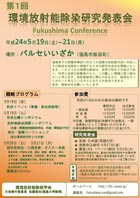PROTECTIVE EFFECT OF BRAZILIAN PROPOLIS (AF-08) ON RADIATION-INDUCED CHROMOSOMAL DAMAGE ON CHINESE HAMSTER OVARY CELLS (CHO-K1)(放射線照射で誘発された卵巣細胞 (CHO-K1) の染色体損傷に対するプロポリスの防御効果)
2012年 環境放射能除染学会
- Instituto de Pesquisas Energéticas e Nucleares (IPEN/CNEN-SP), Brazil
Geyza Spigoti, Paolo Bartolini, Kayo Okazaki - Amazon Food Ltda, Tokyo, Japan
Shigetoshi Tsutsum - School of .Pharmacy, Nihon University, Japan Ken Yasukawa
- School of Pharmaceutical Sciences, Kyushu University of Health and Welfare, Japan
Masahiko Kurokawa
【目的と意義】
過去数年間、さまざまな種類のイオン化放射を多方面の用途に利用することが増えたことに呼応して、放射線防護能を持つ、実効性がありかつ無害な天然化合物に関する研究に特別な関心が寄せられている。
その中で、抗炎症作用、抗腫瘍作用、抗菌作用及びフリーラジカル捕捉作用などいくつかの有利な特性を持つことから、ミツバチ (Apis mellifera) が収集する樹脂混合物であるプロポリスが有望だと考えられている。
従ってプロポリスはイオン化放射の副作用から細胞や生体を守る直接的な抗酸化剤であるといえる。
アマゾンフード提供のブラジル産プロポリス【AF-08】の、 Coγ線照射により卵巣細胞 (CHO-K1)に誘発される遺伝毒性障害に対する放射線防護能を評価するために本研究を実施した。
ABSTRACT
In the last years, particular interest has been given to investigations concerning natural, effective and nontoxic compounds with radioprotective capacity in concert with increasing utilization of different types of ionizing radiation for various applications. Among them, propolis, a resinous mixture of substances collected by honey bees (Apis mellifera) has been considered promising since it presents several advantageous characteristics, i.e., anti-inflamatory, anticarcinogenic, antimicrobial and free-radical scavenging action. It is, therefore, a direct antioxidant that protects cells and organisms from the adverse effects of ionizing radiation. These relevant biological activities are mainly mediated by the flavonoids, present at relatively high concentrations in the propolis. Considering that the chemical composition and, consequently, the biological activity of propolis is variable according to the environmental plant ecology, the present study was conducted in order to evaluate the radioprotective capacity of Brazilian propolis (AF-08), against genotoxic damages induced by 60Co γ-radiation in Chinese hamster ovary cells (CHO-K1). For this purpose, micronucleus induction was analyzed concerning irreparable damage, specifically related to DNA double-strand breaks, that are potentially carcinogenic. CHO-K1 cells were submitted to different concentrations of propolis (5 – 30 µg/ml), 1 h before irradiation, with 1 Gy of γ radiation (0.722 Gy/min). The data obtained showed a decreasing tendency in the quantity of radioinduced damage on cells previously treated with propolis. The radioprotective effect was more prominent at higher propolis concentration. The treatment with propolis alone did not induce genotoxic effects on CHO-K1 cells. Beside that, the treatment with propolis, associated or not with radiation, did not influence the kinetics of cellular proliferation.

